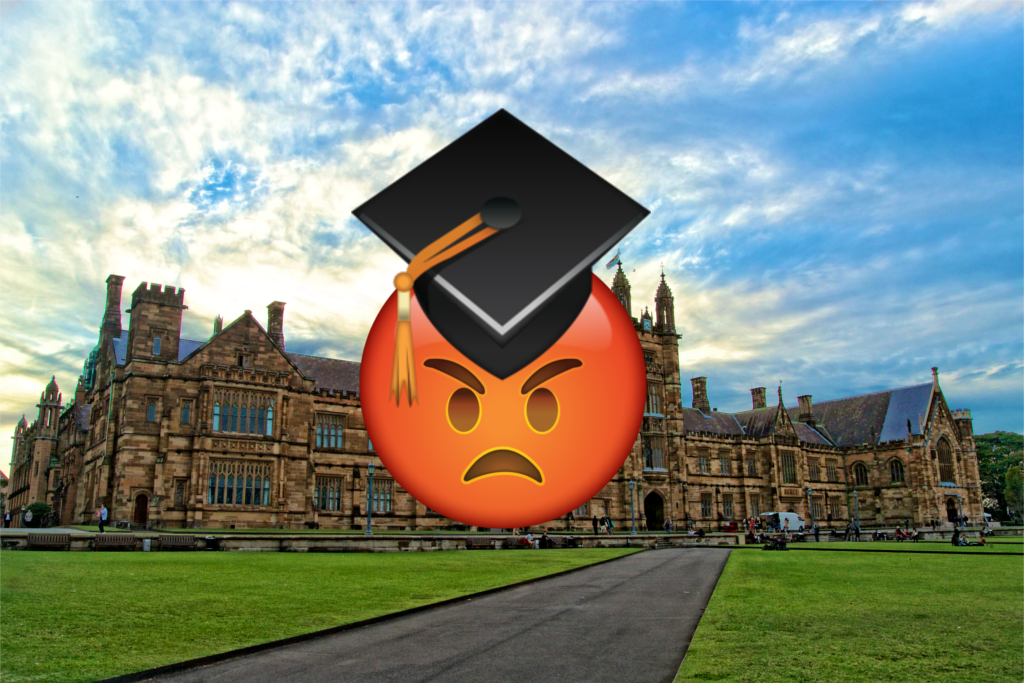Junk Explained: What Exactly Is The Government Trying To Do To Universities?
It's to push people who aren't "academically ready" out of their degrees -- unless they can front up a lot of cash.

The Federal government has announced a plan to remove HECs-HELP access from university students who fail multiple classes in their first year, giving struggling students the option of dropping out or continuing while facing a monumental amount of debt.
In a statement in August, Federal Minister for Education Dan Tehan announced a plan to “put students’ interest first” by rescinding access to HECs-HELP or FEE-HELP for first-year students who have failed “more than 50 per cent of eight or more units of a Bachelor course.”
While unit amounts change between degrees and universities, more than eight units would put students at failing just two classes. A full-time university load sees students take at three to four classes a semester.
This measure is to prevent students from accumulating debt for a course they were not “academically suited” for, effectively giving struggling students a disincentive to continue studying.
“These measures will ensure students can’t take on a study load they won’t complete, leaving them without a qualification but a large debt,” Tehan said in the media release.
In an era where university students are financially and psychologically doing it tougher than ever, key points of this proposal feels like punitive sociopathy. https://t.co/twskO6EGoJ
— Benjamin Law 羅旭能 (@mrbenjaminlaw) August 12, 2020
There are exemptions for special circumstances, such as illness or bereavement. If the student transfers to a different degree, they’ll start again on the potential fail rate, meaning you could fuck up a Fine Arts degree and lose HECs-HELP access, but then regain it if you switched to Economics.
How Have People Reacted To The Government’s Plans?
The announcement has been criticised widely. In an interview with ABC Radio, National Students Union president Molly Willmott said this was a blatant punishment of students during an already difficult space.
“We’re looking at a crisis of mental health with students right now… I don’t think incentivising through fear brings the best results or puts students in a job-ready mindset,” she told AM.
“It will just put more pressure on students in degrees, which will lead to further issues with mental health which we’re already seeing — especially with this year.”
I did this when I was failing multiple subjects due to depression. It added thousands of dollars to my HECS but I needed the money to stay afloat. https://t.co/6OvORPf3TT
— Alex McKinnon (@mckinnon_a) August 13, 2020
In a media statement, Greens MP Mehreen Faruqi echoed Willmott’s concerns, saying “choosing to punish rather than support [students] makes no sense”.
“We should be resourcing universities to help struggling students, not denying those students government support to finish their studies,” she said. “The Liberals are more concerned about saving money than helping students get through university.”
“We should be investing our time and money in building well-funded, fee-free university and TAFE. Instead, all the Liberals are interested in doing is cutting uni funding, hiking up fees, and punishing students who fall through the cracks.”
Academics on Twitter are pointing out additional flaws in the plan, offering anecdotal evidence of students refusing to drop out of subjects they’re failing as it would cut their Youth Allowance payments.
Exceptionally disappointed in the Govt’s decision to remove access to HECS for students with low pass rates. A completely on-brand effort to make things more difficult for our most vulnerable students.
— Dr Alix Thoeming (@alix_thoeming) August 12, 2020
“They say they know they’re going to fail, but they know they are racking up a big HECs debt, but Centrelink is how they’re paying their rent *today*,” wrote Griffith University tutor and lecturer Natalie Osborne.
“The HECs debt is a future problem compared to the need to keep a roof over their head.”
It is also a measure that will only affect university access for lower-income students.
Those with their family’s financial security will be able to continue to study regardless of how “academically suited” they are, unless “academically suited” is a codeword for “wealthy”.
This makes me furious – another measure that will harm the vulnerable and hardest working. Another measure that those with parents to pay off their HECS debts and buy them apartments won’t notice.
— Melissa Davey (@MelissaLDavey) August 12, 2020
In Tehan’s release, he cited examples of students enrolling in multiple universities at once, resulting in debts ranging from $220,000 to $660,000.
But the government has already introduced a HELP loan limit maximum of $152,7000 — and that’s only for medicine, dentistry, veterinary science, and select aviation courses. It’s almost like the cases Tehan cites should have never been allowed to accumulate that much debt.
They’ll also have to pay it back sooner than ever before. Last year, the Federal government lowered the HECs debt repayment threshold to $45,881 a year, which is several thousand dollars below the $48,360 average median wage for Australians.
In June, the Federal Government also proposed significant fee increases by 28 percent for law and commerce subjects and a whopping 113 percent for humanities subjects.
Under this plan, students on HECs-HELP for a three-year humanities, law or commerce degree would now pay $43,500. Previously, the humanities degree would cost students $20,400, and law and commerce degrees would cost $34,000.
